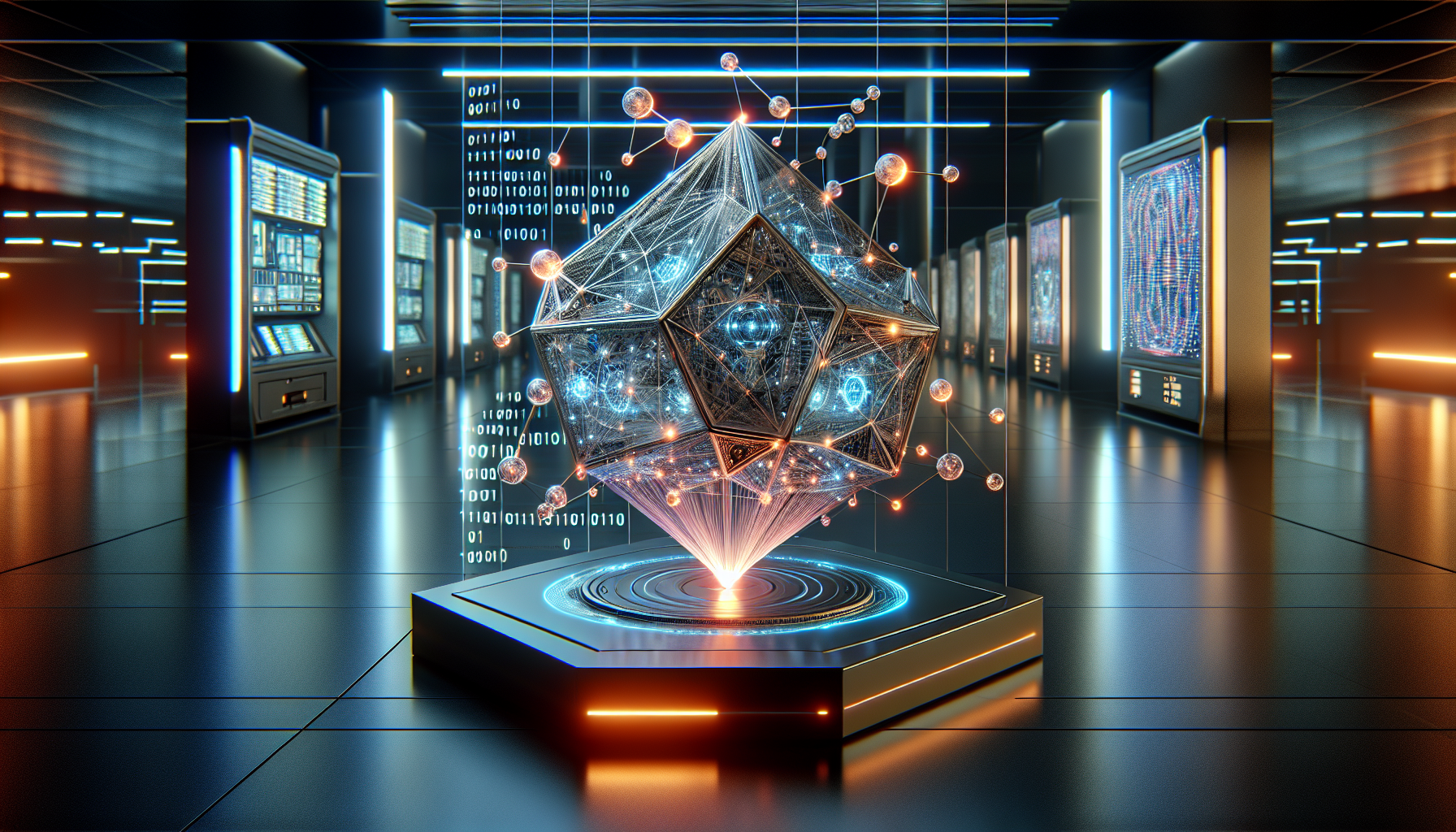Are you ready to embrace the power of artificial intelligence (AI) in your daily life? Look no further than this Beginner’s Guide for Incorporating AI in Daily Life. Whether you’re a tech novice or curious enthusiast, this guide will provide you with the essential knowledge and practical tips to seamlessly integrate AI into your routine. From smart home devices that streamline household chores to AI-backed personal assistants that enhance productivity, this guide will help you navigate the exciting world of AI with ease. So, get ready to unlock the full potential of AI and revolutionize the way you live.

Understanding AI
Defining AI
Artificial Intelligence, commonly known as AI, refers to the development and application of computer systems that possess the ability to perform tasks that normally require human intelligence. These computer systems are designed to learn, reason, and problem-solve, mimicking human cognitive abilities. AI utilizes a range of technologies, such as machine learning, natural language processing, and computer vision, to enable computers to understand, process, and respond to human interactions.
Types of AI
There are various types of AI that cater to different purposes and levels of complexity. Broadly classified, AI can be categorized into three main types: narrow AI, general AI, and superintelligent AI. Narrow AI, also known as weak AI, is designed to perform specific tasks and has a limited scope of capabilities. On the other hand, general AI possesses human-like intelligence and can perform any intellectual task that a human can. Superintelligent AI, yet to be achieved, surpasses human intelligence in all aspects.
AI in Everyday Life
AI has become ingrained in our daily lives, often without us realizing it. From voice assistants like Siri and Alexa to personalized recommendations on streaming platforms, AI has made its way into various aspects of our routines. Whether it’s using AI-powered navigation apps to find the fastest route or relying on AI-enabled health apps to track our fitness, AI has seamlessly integrated into our everyday activities. Its presence can be seen in communication, entertainment, home automation, health and wellness, transportation, education, financial services, shopping, and even work and business.
Benefits of Incorporating AI
Enhanced Efficiency and Productivity
Incorporating AI in different areas of life leads to enhanced efficiency and productivity. AI-powered algorithms and systems can process vast amounts of data, identify patterns, and make predictions at an impressive speed. This enables organizations and individuals to save time and effort by automating repetitive and time-consuming tasks. By delegating these tasks to AI, humans can focus on more complex and creative activities that require human intelligence.
Time-saving Abilities
One of the major benefits of AI is its time-saving abilities. By automating tasks that typically require human intervention, AI technology allows us to complete these tasks faster and more efficiently. For example, using virtual assistants like Siri or Google Assistant, you can quickly get answers to your questions, set reminders and appointments, or even control various smart devices in your home, all with just a voice command. AI-powered chatbots are also commonly used in customer service to provide instant support and resolve queries without the need for human agents.
Improved Decision-Making
AI systems have the capability to analyze large amounts of data and derive meaningful insights from it. This enables better decision-making in various domains, such as finance, healthcare, and business. AI algorithms can detect patterns, trends, and anomalies in data that may go unnoticed by humans. By leveraging this analysis, organizations can make data-driven decisions that are more accurate and informed, leading to improved outcomes.
Personalized Experiences
AI has revolutionized the way we experience various products and services by making them more personalized. From personalized movie and music recommendations on streaming platforms to targeted advertisements on social media, AI algorithms analyze user preferences, behavior, and past interactions to provide tailored content and recommendations. This not only enhances the user experience but also helps businesses in better understanding their customers, thus improving customer satisfaction and loyalty.
AI in Communication and Entertainment
Virtual Assistants
Virtual assistants, such as Siri, Alexa, and Google Assistant, are AI-powered applications that can perform tasks or provide information based on voice commands or typed queries. These assistants can answer questions, set reminders, provide weather updates, control smart home devices, play music, and perform a wide range of other tasks, making them a valuable addition to everyday life.
Chatbots
Chatbots are AI programs that simulate human conversation through natural language processing. They can be found on websites, messaging platforms, and mobile apps, providing instant responses to customer queries and guiding them through various processes. Chatbots are increasingly being used in customer service to handle routine inquiries, offer product recommendations, and provide support, saving both time and resources for businesses.
Voice Commands and Smart Speakers
Smart speakers, such as Amazon Echo and Google Home, have gained popularity with their AI-powered voice command capabilities. By simply using voice commands, you can control smart home devices, play music, get news updates, set alarms, and even order items online. These devices utilize natural language processing and voice recognition technology to understand and respond to your commands.
AI in Social Media
AI plays a significant role in social media platforms by analyzing user preferences and behavior to deliver personalized content and advertisements. It can detect and filter out offensive or inappropriate content, thus maintaining a safer online environment. AI algorithms also help social media platforms identify and recommend relevant people and groups for users to connect with, enhancing the overall user experience.
AI in Video and Music Recommendations
Streaming platforms like Netflix and Spotify rely on AI algorithms to analyze user data, including watch or listening history, ratings, and preferences, to suggest personalized video content or music recommendations. This helps users discover new movies, shows, or artists tailored to their interests, ensuring an engaging and customized entertainment experience.
AI in Gaming
AI has made significant advances in the realm of gaming, enabling more immersive and realistic experiences. From non-player characters (NPCs) with intelligent behaviors to adaptive difficulty levels based on player performance, AI enhances the gameplay and creates more challenging and dynamic game environments. AI can also be utilized in game design and development processes, automating certain tasks and improving game physics, graphics, and overall performance.
AI in Home Automation and Security
Smart Home Devices
AI has transformed the concept of home automation by enabling the integration of various smart devices, such as thermostats, lighting systems, security cameras, and appliances. With AI algorithms, these devices can learn from user behaviors and adapt to their preferences. For example, smart thermostats can analyze temperature patterns and adjust settings to optimize energy usage. Smart lighting systems can automatically adjust brightness based on natural lighting conditions or user preferences.
IoT Integration
AI plays a crucial role in the integration of Internet of Things (IoT) devices in smart homes. By connecting and exchanging data between different devices, AI algorithms can optimize energy consumption, automate routine tasks, and provide personalized experiences. For instance, AI can intelligently manage energy usage by coordinating the operation of smart appliances, optimizing lighting and heating systems, and reducing overall energy waste.
Automated Energy Management
AI-powered energy management systems analyze energy usage patterns and automatically adjust settings to optimize efficiency. These systems can control heating, ventilation, and air conditioning (HVAC) systems, regulate lighting levels, and manage power-consuming devices based on occupancy and usage data. By reducing energy wastage and optimizing usage, AI helps in achieving a more sustainable and cost-effective approach to energy management.
Surveillance and Security Systems
AI has enhanced home security systems by enabling intelligent surveillance and threat detection. AI algorithms can analyze video feeds from security cameras, detect suspicious activities or objects, and alert homeowners or authorities in real-time. Facial recognition technology can also be implemented to identify authorized individuals and enhance access control systems, further strengthening home security.

AI in Health and Wellness
Fitness Trackers and Wearables
Fitness trackers and wearables equipped with AI capabilities have revolutionized the way we monitor and manage our health. These devices track various metrics like heart rate, sleep patterns, calories burned, and exercise activity. AI algorithms process this data to provide personalized insights and actionable recommendations, helping individuals reach their fitness goals and maintain a healthy lifestyle.
AI in Healthcare Diagnosis
AI has the potential to significantly impact the field of healthcare by aiding in the diagnosis of diseases and health conditions. AI algorithms can analyze medical images, such as X-rays and MRIs, to detect abnormalities or signs of diseases. This improves the accuracy and efficiency of diagnoses, allowing for early intervention and better patient outcomes. AI can also be used to analyze patient data and medical records, identifying patterns and providing insights that can support doctors in making informed treatment decisions.
Personalized Medicine
AI has the potential to revolutionize the field of personalized medicine by tailoring treatments and medications to individual patients. By analyzing vast amounts of patient data, including genetic information, medical records, and lifestyle factors, AI algorithms can identify patterns and correlations that help predict treatment outcomes and recommend the most effective interventions for each patient. This approach maximizes treatment efficacy while minimizing adverse reactions and side effects.
Mental Health Support
AI technology is being utilized to provide mental health support and interventions. Chatbots equipped with natural language processing capabilities can offer empathetic conversations, provide coping strategies, and connect individuals with appropriate resources. AI-powered emotion recognition systems can analyze facial expressions or voice patterns to detect signs of distress or mental health disorders, enabling timely intervention and support.
AI-Enabled Health Apps
AI has transformed the landscape of health apps by enhancing their capabilities to provide personalized and real-time insights. From symptom checkers to medication reminders and virtual doctor consultations, AI-powered health apps improve access to healthcare information and services. By analyzing user data, these apps can offer personalized recommendations or alerts based on individual health conditions, making self-care and monitoring more effective and convenient.
AI in Transportation
Autonomous Vehicles
One of the most prominent applications of AI in transportation is autonomous vehicles. These vehicles utilize AI algorithms and sensors to perceive and understand the surrounding environment, make real-time decisions, and navigate without human intervention. Autonomous vehicles have the potential to enhance road safety, reduce accidents caused by human error, and revolutionize transportation systems by optimizing traffic flow and reducing congestion.
Route Optimization
AI algorithms can analyze various factors, such as traffic patterns, road conditions, and historical data, to optimize route planning and navigation. By selecting the most efficient routes, AI-powered navigation systems can help individuals save time and fuel, reducing traffic congestion and improving overall transportation efficiency. Whether it’s finding the quickest route to work or avoiding traffic jams during a road trip, AI-based route optimization systems are invaluable in daily life.
Traffic Management
AI plays a crucial role in traffic management systems by monitoring and analyzing traffic conditions in real-time. AI algorithms can integrate data from various sources, such as traffic sensors, cameras, and GPS devices, to detect congestion, accidents, or other anomalies. This information can be used to optimize traffic signal timings, reroute vehicles, and provide real-time updates to drivers, ensuring a smoother flow of traffic and minimizing delays.
Ride-Hailing Apps
Ride-hailing apps like Uber and Lyft rely heavily on AI algorithms to match drivers with passengers, optimize routes, and predict demand patterns. AI-driven algorithms consider factors like location, time of day, traffic conditions, and availability of drivers to provide efficient and convenient transportation services. These apps not only simplify the process of finding a ride but also ensure a seamless and personalized experience for both riders and drivers.

AI in Education
Virtual Classrooms
AI has transformed the way education is delivered by enabling virtual classrooms. With the help of AI-powered platforms, students and teachers can connect, interact, and collaborate online, regardless of geographical boundaries. Virtual classrooms incorporate features such as video conferencing, screen sharing, and real-time collaboration tools, creating an immersive and engaging educational experience.
Adaptive Learning
By leveraging AI algorithms, adaptive learning platforms can personalize the learning experience to cater to the individual needs and capabilities of each student. These platforms analyze student performance data, identify areas of strengths and weaknesses, and provide customized content and exercises. Adaptive learning ensures that students receive targeted instruction and support, enabling them to learn at their own pace and maximize their academic potential.
Smart Content
AI is being used to develop smart content that enhances the learning experience. Smart content includes interactive elements, simulations, and augmented reality (AR) or virtual reality (VR) components, making learning more engaging and immersive. AI algorithms analyze user interactions with the content, adapting the presentation and difficulty level to match individual learning styles and preferences.
Tutoring and Personalized Learning
AI-powered tutoring systems offer individualized support and guidance to students. These systems analyze student performance, identify areas that require improvement, and provide targeted feedback and resources. AI tutors can adapt their teaching strategies based on the student’s learning style, progress, and individual needs. This personalized approach ensures efficient and effective learning, catering to the strengths and weaknesses of each student.
AI in Financial Services
Automated Customer Support
AI has transformed customer support in the financial services industry by providing automated, 24/7 assistance. Chatbots and virtual assistants can handle routine customer inquiries, provide information about account balances, transactions, and other financial services, and even guide customers through the onboarding process. AI-powered customer support systems save time and resources while ensuring a seamless and efficient customer experience.
Fraud Detection
AI algorithms play a crucial role in detecting fraudulent activities and protecting financial institutions and their customers. By analyzing vast amounts of transaction data, AI systems can identify suspicious patterns, anomalies, or potential fraud in real-time. This allows financial institutions to take immediate action to prevent financial loss and maintain the integrity of their services.
Chatbots for Banking
Chatbots are widely used in the banking industry to deliver personalized services and support. They can provide assistance in various areas, such as account inquiries, transaction history, money transfers, and loan applications. AI-enabled chatbots simulate human-like conversations, understand natural language queries, and provide accurate and relevant responses, ensuring a convenient and efficient banking experience for customers.
Investment Management
AI has revolutionized investment management by enabling robo-advisors, AI-powered platforms that provide automated financial advice and investment recommendations. By analyzing market data, investor preferences, and risk tolerance, AI algorithms can offer personalized investment strategies and optimize portfolios accordingly. Robo-advisors provide affordable and accessible investment management services, democratizing the world of finance.

AI in Shopping and E-commerce
Personalized Recommendations
AI algorithms analyze customer data, including purchase history, browsing behavior, and preferences, to provide personalized product recommendations. This enhances the shopping experience by suggesting relevant and appealing products to customers, increasing the likelihood of purchase and customer satisfaction. Personalized recommendations enable users to discover new products and make informed decisions, ultimately benefiting both customers and businesses.
Virtual Shopping Assistants
AI-powered virtual shopping assistants are becoming increasingly popular in the e-commerce industry. These assistants can use natural language processing to understand customer queries and assist them in finding products, comparing prices, and making purchases. Virtual shopping assistants ensure personalized and interactive online shopping experiences, emulating the assistance provided in a physical retail store.
Visual Search
Visual search technology utilizes AI to understand images or visual inputs and provide relevant search results. By analyzing the visual characteristics of an image, AI algorithms can identify and match products, enabling users to search for items simply by taking a picture or uploading an image. Visual search facilitates quicker and more accurate product discovery and is particularly useful when trying to find a specific item based on its visual appearance.
Chatbots in Customer Service
Chatbots are widely employed in customer service for online shopping platforms. They can handle customer inquiries, resolve issues, provide assistance with product selection, and even process orders. AI-powered chatbots can understand natural language queries, offer tailored responses, and guide customers through the purchase process. Integrating chatbots in customer service ensures prompt and efficient support, increasing customer satisfaction and enhancing the overall shopping experience.
AI in Work and Business
Automated Data Analysis
AI-powered tools and algorithms are utilized to analyze vast amounts of data quickly and accurately. By automating data analysis processes, businesses can gain valuable insights, identify trends, and make data-driven decisions. AI algorithms can detect patterns, anomalies, and correlations that may not be apparent to human analysts, enabling businesses to optimize operations, improve efficiency, and identify new business opportunities.
AI in Market Research
AI technology has transformed market research by enabling more efficient and comprehensive data collection and analysis. AI algorithms can scour the internet, social media platforms, and other sources to gather relevant data for market analysis. By analyzing consumer preferences, sentiment, and behavior, AI provides businesses with valuable insights into market trends, customer needs, and competitive landscapes, aiding in strategic decision-making.
Customer Relationship Management (CRM)
AI-powered CRM systems enhance customer relationship management by analyzing customer data, interactions, and preferences. AI algorithms can identify patterns in customer behavior, predict customer needs, and recommend personalized offers or marketing campaigns. AI-driven CRM systems enable businesses to nurture customer relationships, improve customer satisfaction, and increase sales by delivering targeted and relevant experiences.
AI-Powered Chat and Support Systems
AI-powered chat systems are increasingly employed in customer support to provide instant, efficient, and personalized assistance. These systems can handle routine inquiries, answer frequently asked questions, and provide guidance or troubleshooting. AI algorithms enable chat systems to understand natural language queries, provide accurate responses, and learn from interactions, ensuring a seamless customer support experience.
Enhanced Collaboration and Communication
AI technologies facilitate enhanced collaboration and communication in the workplace. AI-powered collaboration platforms can automate repetitive tasks, streamline workflows, and improve team efficiency. These platforms often include features like document sharing, project management tools, and virtual meeting capabilities. Additionally, AI-based communication tools can facilitate language translation, transcription, and voice recognition, minimizing communication barriers in multicultural or multilingual work environments.
Incorporating AI into our daily lives offers numerous benefits and opens up exciting possibilities for enhanced efficiency, productivity, and personalized experiences. From AI-powered virtual assistants and chatbots to smart home automation, health applications, transportation advancements, and beyond, AI is revolutionizing various aspects of our lives. As technology continues to evolve, AI will undoubtedly continue to shape and improve our daily routines, making our lives more convenient, productive, and enjoyable.







Leave a Reply